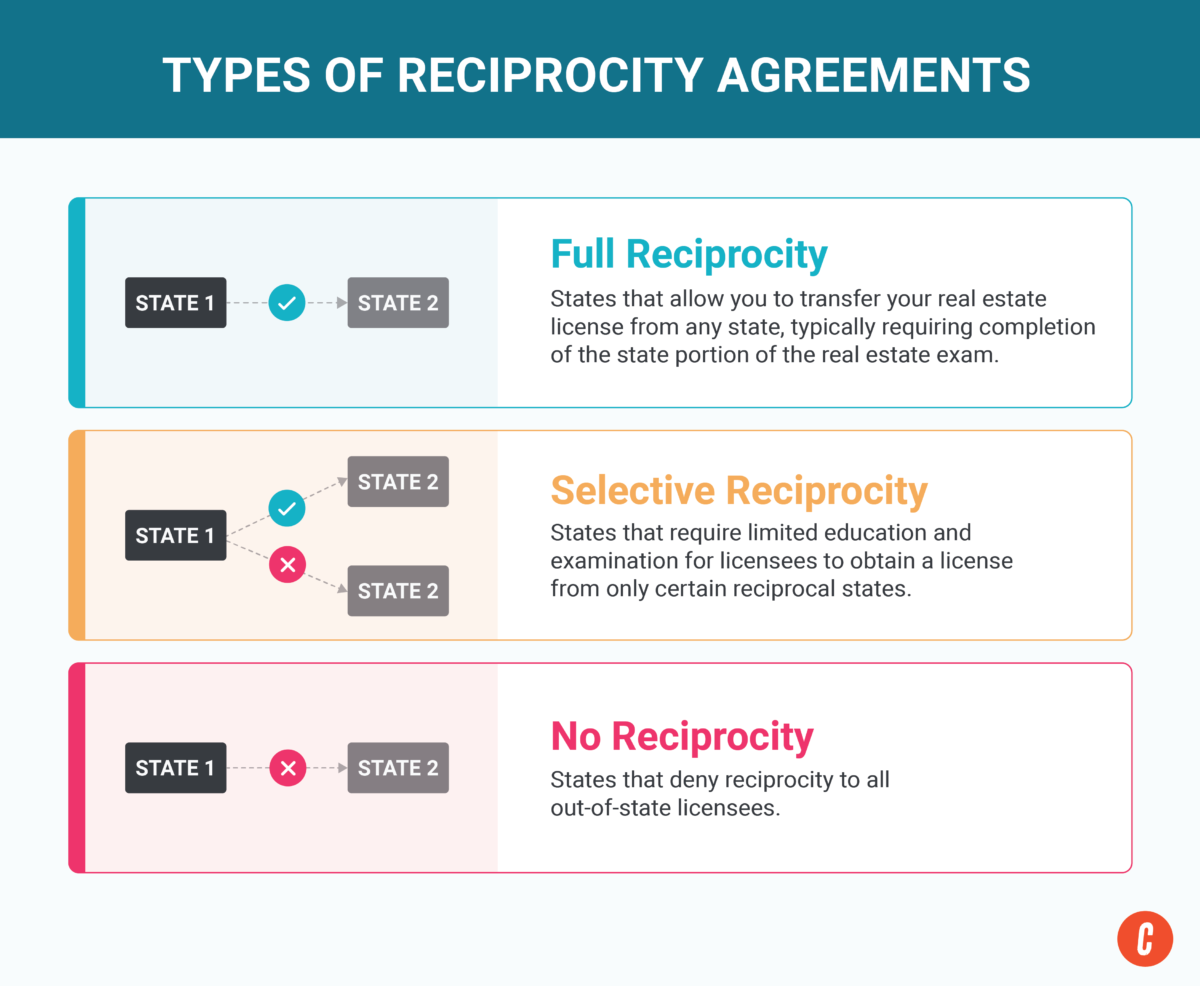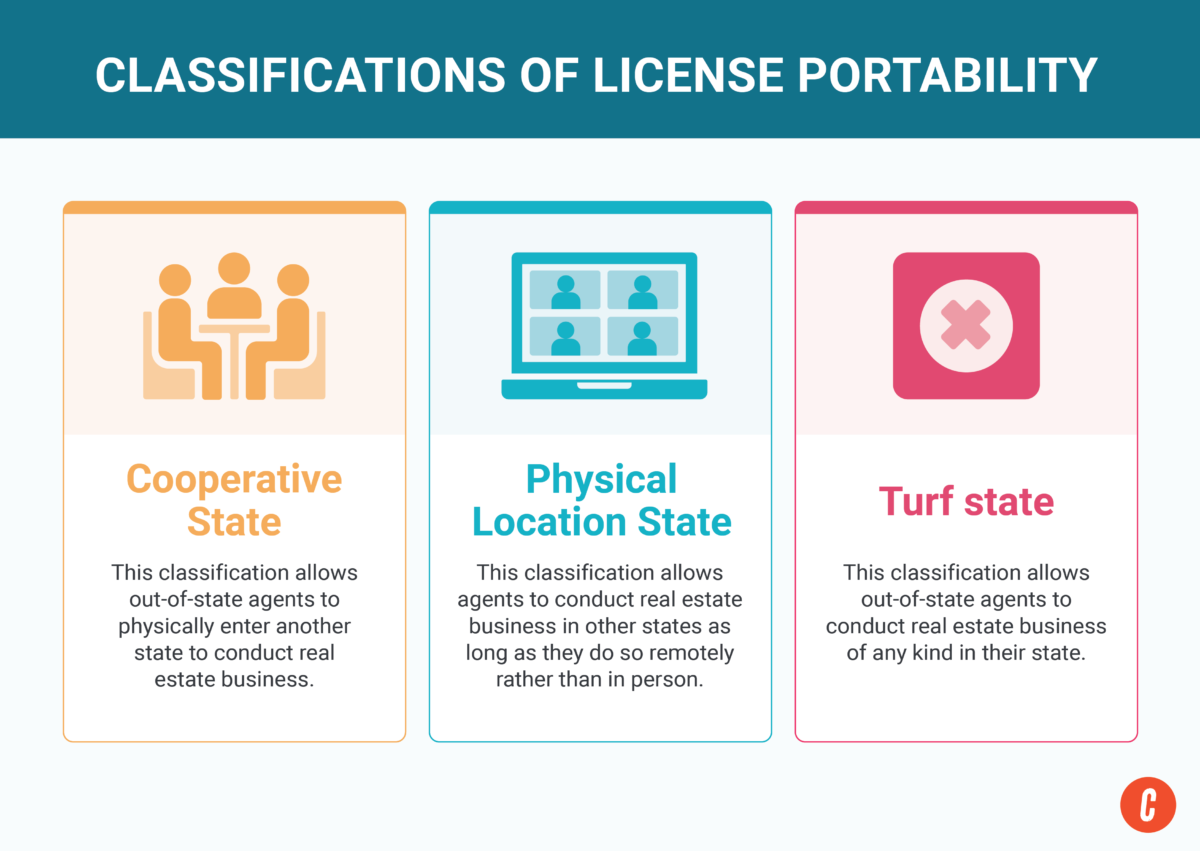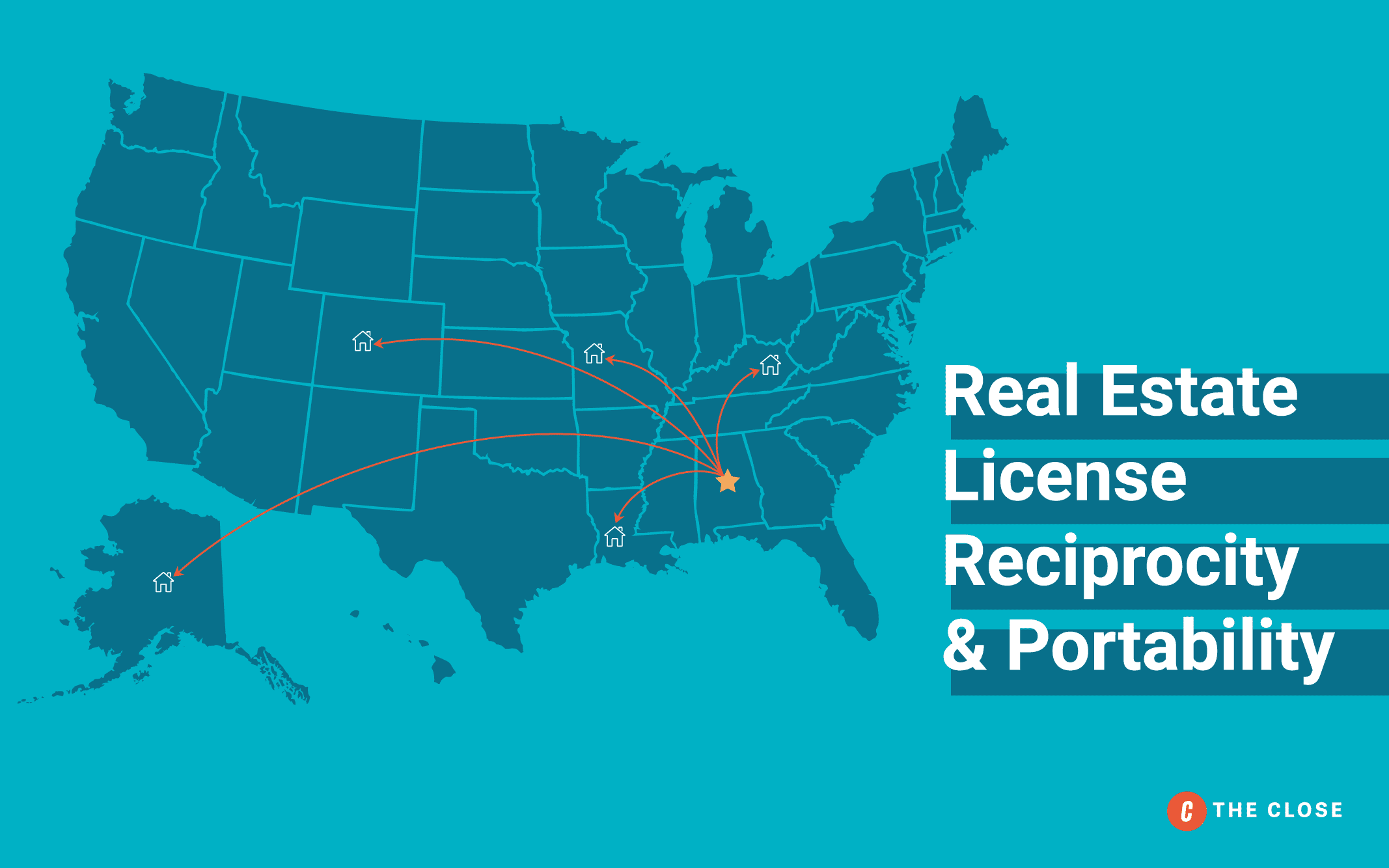Picture this: you have a real estate license in one state, but you have a client in another state. No transaction for you, right? Wrong! That’s where real estate license reciprocity and portability come in. Reciprocity allows agents and brokers to obtain a license in a new state without completing all licensing requirements, while portability enables out-of-state agents and brokers to complete transactions within particular states. This way, no transaction falls through the cracks! Read along to understand the definition and types of reciprocity and portability and how it impacts each state.
What Is Real Estate License Reciprocity?
Real estate license reciprocity is when a licensed real estate agent in one state becomes licensed in another without taking additional prelicensing courses or, in certain situations, taking a licensing exam. However, since every state has different requirements to get a real estate license, becoming an agent or broker in one state doesn’t automatically allow you to buy and sell real estate in any other state.
Real estate agent and broker reciprocity can be complex because there are different types of reciprocity and varying rules in every state. For example, a realtor, real estate agent, or broker in any state can become licensed in North Carolina by passing the state portion of the real estate exam. However, North Carolina real estate agents who want to work in a different state may have to complete all of that state’s requirements.
Types of Real Estate Reciprocity

In general, each US state offers one of these three types of real estate license reciprocity:
- Full reciprocity: States with full reciprocity allow you to transfer your real estate license from any other state to theirs. This usually means they waive the education requirements for their state and have minimal requirements, like applying for your license and sometimes taking the state portion of the real estate exam.
- Partial or selective reciprocity: These states have reciprocity agreements with specific states. For example, Maryland has a reciprocity agreement with Oklahoma and Pennsylvania, which means agents from Pennsylvania or Oklahoma can easily transfer their licenses to Maryland. However, an agent from any other state must complete all the Maryland license requirements, just like a first-time licensee.
- No reciprocity: In a state with no reciprocity, you will most likely have to complete all the education and licensing requirements.
States With Full Reciprocity
There aren’t many full license reciprocity states, but they are the most flexible. These states make it easy for licensed agents or brokers from any other state to transfer their licenses. Usually, full real estate broker license reciprocity means that you only need to apply for a license in the new state or take a small portion of the real estate exam.
The states with full real estate license reciprocity laws are:
- Alabama
- Colorado
- Georgia (except Florida)
- Maine
- Mississippi
- New Hampshire
- North Carolina
- South Carolina
- Virginia
Important Note: In order to get reciprocity in any state, your current license must be active and in good standing. You must not have had any disciplinary action taken against you or have any outstanding ethical or business practice issues.
States With Partial Reciprocity/Selective Reciprocity
Partial or selective reciprocity is exactly what it sounds like—states that have reciprocity agreements with a small number of specific states. This is where things can get confusing because even the reciprocity agreements in each state vary pretty drastically. There is no exact science, so you must check the specific state you want to move to.
Here are the 19 states with partial real estate reciprocity laws:
- Arkansas: Alabama, Colorado, Florida, Georgia, Iowa, Kansas, Louisiana, Mississippi, Nebraska, Ohio, Oklahoma, Pennsylvania, South Dakota, Washington, and West Virginia
- Connecticut: Alabama, Colorado, Florida, Georgia, Illinois, Indiana, Massachusetts, Mississippi, Nebraska, New York, Ohio, Oklahoma, and Rhode Island
- Florida: Alabama, Arkansas, Connecticut, Georgia, Illinois, Kentucky, Mississippi, Nebraska, Rhode Island, and West Virginia
- Illinois: Colorado, Connecticut, Florida, Georgia, Indiana, Iowa, Kentucky, Nebraska, and Wisconsin
- Iowa: Arkansas, Georgia, Louisiana, Massachusetts, Minnesota, Mississippi, and North Dakota
- Louisiana: Alabama, Arkansas, Colorado, Georgia, Iowa, Mississippi, New Mexico, Oklahoma, and Pennsylvania
- Maryland: Oklahoma and Pennsylvania
- Massachusetts: Connecticut, Rhode Island, West Virginia, Nebraska, Iowa, Tennessee, Mississippi, Colorado, Georgia, Pennsylvania, and New Mexico
- Minnesota: Colorado, Iowa, Nebraska, North Dakota, Oklahoma, and South Dakota
- Nebraska: Licenses “by recognition”
- Nevada: Arizona, Delaware, Illinois, Iowa, Louisiana, Oklahoma, Texas, Washington, Colorado, Idaho, Indiana, Kentucky, Minnesota, South Carolina, Utah, and West Virginia
- North Dakota: Georgia, Iowa, and Minnesota
- Ohio: Arkansas, Connecticut, Kentucky, Mississippi, Nebraska, Oklahoma, West Virginia, and Wyoming
- Oklahoma: Alabama, Arkansas, Iowa, Louisiana, Maryland, Nebraska, North Dakota, and South Dakota
- Pennsylvania: Arkansas, Georgia, Louisiana, Maryland, Massachusetts, and New York
- Rhode Island: Connecticut and Massachusetts
- Utah: Georgia, Mississippi, and Alberta, Canada
- West Virginia: Florida, Kentucky, and Ohio
- Wisconsin: Illinois and Indiana
States With No Reciprocity
States with no real estate agent or broker reciprocity will not allow any agent or broker to practice in their state without taking all pre-licensing courses, passing the full real estate exam, and choosing a brokerage in the new state. The good news is there are plenty of online real estate schools to help make this as easy as possible. Once you’ve completed your schooling and passed your exam, you’ll need to apply for a new license in the new state.
These are the 21 states with no license reciprocity:
- Alaska
- Arizona
- California
- Delaware
- Hawaii
- Idaho
- Indiana
- Kansas
- Kentucky
- Michigan
- Missouri
- Montana
- New Jersey
- New Mexico
- New York
- South Dakota
- Tennessee
- Texas
- Vermont
- Washington
- Wyoming
Pro Tip: If you have to get a real estate license in a new state, make sure you find the best possible resources to help you complete your education as efficiently as possible. Check out our tips on How to Study for the Real Estate Exam: Tips & Strategies.
What Is Real Estate License Portability?
Real estate license portability is often confused with reciprocity but works a little differently. Portability is when you don’t need to get a full license but want to conduct a single transaction in another state. It differs from reciprocity as it enables agents to engage in real estate business across their home state borders, but it is not a long-term solution for agents relocating to a new location.
Types of Real Estate Portability

There are three types of real estate license portability, which differ per state and specify the conditions for an out-of-state real estate agent to work within the state.
- Cooperative: States with cooperative portability allow real estate agents from another state to co-broker a transaction as long as the other agent is licensed in the home state.
- Physical location: Physical location states allow you to represent a client in an out-of-state transaction, but only if you do it remotely.
- Turf: Turf states don’t allow any form of portability; if you don’t have a real estate license in their state, you cannot work in any transactions.
Here’s a breakdown of the portability regulations for each state:
|
|
|
FAQs
Which state has the most reciprocity for a real estate license?
There are nine states that offer real estate license reciprocity with all states; Alabama, Colorado, Georgia, Maine, Mississippi, New Hampshire, North Carolina, South Carolina, and Virginia. If you are licensed in any other state, it is more simple to get a license in these states. However, if you currently hold a license in one of these five states, it may not be as easy to get a license in another state.
Which states have reciprocity with California?
California has no reciprocity agreements with any other state. If you want to become a real estate agent in California, you must complete 135 hours of education and meet all the requirements as first-time agents and brokers.
Which states have reciprocity with the New York real estate license?
As of 2024, New York State has no reciprocal agreements with any other state. However, you can submit a request for the courses to be waived. These requests are evaluated individually, and you have to submit a description of the real estate courses you’ve already completed, proof of course completion, and a detailed outline.
Bringing It All Together
Real estate agent and broker reciprocity is complex when you think about all the states and the different rules and requirements. If you’re considering moving to a new state, make sure you look into their reciprocity and portability agreements and evaluate what you’ll need to do to get a second real estate license.
Do you have multiple licenses? Let us know which states you’re licensed in!











